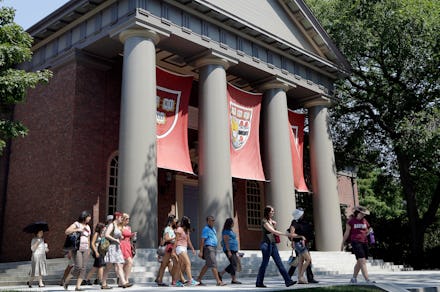Science Explains Why Harvard Grads Just Won't Shut Up About It

The news: If you know that one guy who always wears his Ivy League sweater to dinner, or rambles about how his college football team is doing this year, it might not be because he's a showoff. He might be insecure.
That's the argument put forward by a new University of Pennsylvania study published in Psychological Science, examining how the school's students relate to their Ivy League status. While the school might appear to have a lower profile than the so-called Big Three — Harvard, Yale, Princeton — the study researchers found that UPenn students were more likely to play up their Ivy status than Harvard students.
"Individuals generally prefer to be in higher-status or more positively valenced groups, both to enhance their self-esteem and to project a more impressive self to others," the researchers wrote.
The study: For the study, psychology professor Paul Rozin asked 204 Americans to free-associate words with the phrase "Ivy League." While around 40% of the respondents thought of Harvard, less than 2% mentioned UPenn.
But when 54 Harvard and 53 UPenn students were asked to free-associate words related to their school, the opposite was true: Only four Harvard students mentioned "Ivy League" while 16 UPenn students did.
What does this mean? According to Rozin, this is an example of "asymmetrical social Mach bands": the tendency of marginalized people in a group to play up their insider status. The study found that while Harvard students might feel secure about belonging in the Ivy League, UPenn students might feel the need to play it up more.
In the same study, Rozin ran two similar experiments and found that this phenomenon applied to institutions as well. Regional schools are more likely than national schools to refer to themselves as "universities," and small, local airports are more likely than large, famous airports to refer to themselves as "international."
Though not specifically discussed in the study, one wonders whether the same principle applies to dictators who give themselves especially regal names like "his Excellency President for Life, Field Marshal Alhaji Dr. Idi Amin Dada, VC, DSO, MC, CBE" or countries that try to hide their oppressive status with a people-oriented names like "Democratic People's Republic of Korea."
So while bragging is never attractive, sometimes the other person might not be trying to make you feel bad — they're trying to make themselves feel better.